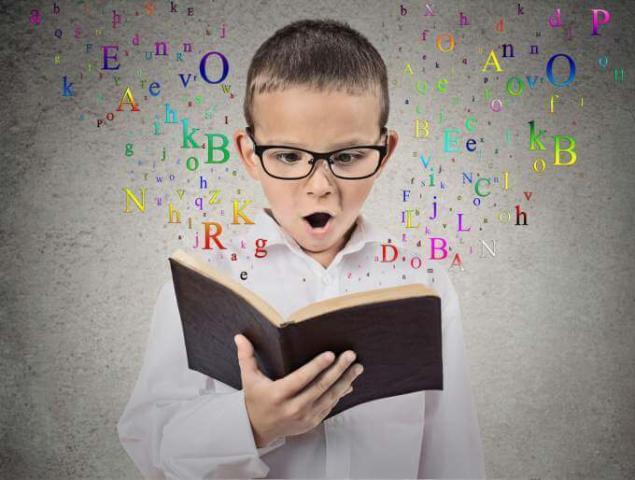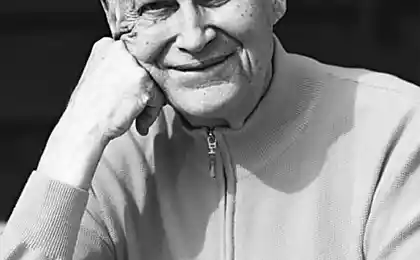699
What to read with children from 7 to 10 years
While the child was small, we had read the book aloud to him in the evening before going to bed, and it was a special ritual. And we knew that someday he will learn to read and be himself. And now he was in first grade, second, third, and something of the book in his hands, we have not seen before bedtime.

I stop loving to read? We do not share his love of reading? Few books offer him? Or some special need him? Or is it due to the fact that it is a lot of time on the computer spends? Such issues do not stop to ask yourself and caring adults often do not notice how joyful the verb "read" it is not clear when the time to turn into a boring "nadochitat". That also prevents even the most interesting: do not let walk, does not allow to play on the computer, and even a movie because it did not look! He is a synonym for "nadodelaturoki».
We read all childhood child because he could not read. And then the time came when he learned to read, and we gave him the right to enjoy the book itself. But what is a "learn to read"? The fact that a child can now add the syllables in words and words into sentences, does not mean yet that he is able to read.
To be able to read - it is able to fly on a broomstick with Little Baba Yaga O. Preussler, wade in the dense forest of snowdrops or stand on guard, because it gave my word of honor, like the hero of the eponymous story by L. Panteleyev. But while you're folding letters and syllables while waiting, when will the proposal, nothing of the sort is impossible.
Better than described it Pennac Daniel in his book "How novel," perhaps, do not say: "Once we were - he was a fairy tale, and we - the undivided Trinity, reunites every evening; now he is left alone with a hostile book.
We attach it to travel with the speed of thought; now he crushed stupidity efforts. We gave him ubiquity - now he is a prisoner of his room, class, books, lines, words. Easy for our speech made him weightless; Now impenetrable swarming is choking most letters attempt to surrender to the dream.
Where hid magical characters: brothers, sisters, kings, queens, all driven by villains heroes who relieves him of the burden of life, calling to his aid? Is it possible that they were somehow connected with these severely flattened traces of ink - letters ... He and his characters with choking in the thick books »
! Do not rush to transfer your child read debt. Prolong the pleasure of joint communication with the book. It will take a little time, and he will snatch you book and favorite place to read himself, because he remembers it by heart - so be it! But how cool he is reading, not haltingly and not mangling the word! Do not read this, we are waiting for him ?! There will come a night when you put the book and strictly say, "All is no longer ask, we read" one more page, "go to sleep", and know that he had read "another page" on the next night, and even not just one, because he did not wait to find out what's next, but wait until the evening was unbearably long.
And perhaps, someday will come a time when the teacher group extended day will not cause the child to his desk so that he was reading aloud, but in a whisper, because everyone else is doing homework. And wear a cap fairies, small, with a long train, put their first-graders on the carpet (some will certainly lie down) and will read their favorite books aloud and wait until someone does not snatch the book to read on ... and again wait until the last, twenty-fifth and twenty-eighth, the most difficult to read does not dare to say: "and you can count on me?»
Just do not try these techniques to trick a child, and now knowing a certain technique. Children catch smell. Once your primary goal will be "to teach him to read" or "it is necessary to do so to grown-educated", everything stops working. The carriage turn into a pumpkin again. The law in all the same: to infect, transfer only what you love. Love is selfless. Love to read themselves, love to read with him, love him, who can or who can not read. And do not ask questions, checking the "reading comprehension", discuss what you actually care about, stop where you want to stop. There is no "right", there is a "want».
What do we read? Of course, you will read and re-read a favorite from childhood: he was our child, even in an age when a few times when you want to return to the "Snow Queen" and "Thomasina" Niels and Dunno. Sometimes you will be surprised that in a literary reading textbook appeared familiar tale of childhood, which has long lived like you. Do not worry, take it as a surprise, a pleasant meeting, Rejoice, Rejoice doubly for those children who will meet for the first time with this book.
We must remember that the needs of the child's soul in the magic of this age are reduced (though never end!), And to replace the need to come in friendship, the need to be part of the team and become topical stories from the lives of children. They passionately and around manifold describe Nosov in his stories, in books E. Assumption "Crocodile Gena and his friends", "Uncle Fyodor, dog and cat", there is "Hurry, Crumb and netak" Yefim Chepovetskogo " Adventures of Cipollino "and" Journey to the Blue Arrow "Gianni Rodari" Adventures of Tom Sawyer "by Mark Twain's" The Adventures of Emile Lennibergi "A. Lindgren.
And Pamela Travers in his "Mary Poppins" miraculously connects the world of magic, fairy tales and school reality. There are miracles, and life according to the rules. And the thin-thin line between real and unreal, possible and ... let's not say "impossible" because it is possible for children. This is how they live, imagining, inventing stories, which can be caught. And fall! You can travel with the east wind, you can talk to birds, can be worn in a small valise everything you need, then there is also a cot and a piano ... And Mary Poppins is remarkable that grants a lifetime image of the ideal educator: what if someone wants to future to teach it, educate it.
At this age, just need to go on a spaceship to a distant star as Alice from the story of K. Bulychev "Alice's Adventures"; tremble in the forest, along with Bilbo, making their way to the dragon ( "The Hobbit" John. Tolkien), and continue to discover the world around him to solve puzzles and to ask new questions.
This is the age when a child's life unnoticed, but all can enter the encyclopedia. Just do not leave it to them one on one, ask them for answers themselves - you, too, something you can not know. Why is the solar eclipse, the name of the brightest star, which all winter hanging over your balcony - is "Astronomy"; Who are the Pharaohs, the Vikings came from - "Culture of Peace"; How does the body - "Art»
. The main thing is not to bore the child's long search for the answer, at first try to quickly find, read a short history and an interesting cover until the next time. Our children at this age, interested in everything - from a needle to uctroystva spacecraft. This picture colorfully complement the series of books "Scientists - the children." Did you enjoy and "great children" B. Voskoboynikova (Suvorov, Lermontov, Champollion, Avicenna, Pascal).
Settle into your home, "Atlas of the World" (certainly great), where you can find a place where Atlantis was, to make sure that from Moscow to Turkey, where you are going in the summer, not so far, and to Haiti - very far, but it is not prevented hundreds of rescuers to be there to help people after the earthquake.
Books for children from 7 to 10
And probably the most important. Elementary School Age - an age when actively forming ethical and moral criteria (honesty, fairness, a sense of duty, conscience), and book characters actively help in this. Kids bored listening notation and stories about how to act and how not to, as an example of Robin Hood can all awaken the desire to help the poor and disadvantaged; King Matt Janusz Korczak learn to dream of a just State; "Little Princess" and "Little Lord Fauntleroy" tell what the nobility and generosity, will learn to forgive and not be like the offenders. But "Star Boy" better look. The two parts of the film forced to respond with heart and soul, and there is no doubt that Oscar Wilde wrote for this
. At this age, children tend to appear first metaphysical question: "where I came", "why do people die?", "Who is God?". And here do not help the encyclopedia, help authors, philosophers: M. Maeterlinck and his "Blue Bird", A. Exupery "The Little Prince", A. Lindgren and "The Brothers Lionheart". Let none of the books do not have a direct answer (as though no one), they provide an opportunity for children to believe in the infinite life, the wisdom of being, in what the eyes can not see, but he feels and knows the heart. From such a disposition can be born the discovery that the world is not made ...
We did not say a word about poetry, it is unfair. Poems need verses are very important in a child's life! They provide an opportunity to peer into the surrounding paintings, stop watch, to distinguish the nuances, so the poems I would like to teach the children for this.
Try it! literary reading textbooks from first to fourth grade are filled with the best samples of Russian poetry - relive her children, just as in early childhood, we recited "Frost and the Sun", when it was cold and the sun, and it was so obvious that it could not cause our admiration. Peering, evaluating, learning context, they will not be monotonous to say: "Tell me, uncle ...", and they will be proud to say: "Tell me, uncle!»
. Author: Tatiana Kurbatova

I stop loving to read? We do not share his love of reading? Few books offer him? Or some special need him? Or is it due to the fact that it is a lot of time on the computer spends? Such issues do not stop to ask yourself and caring adults often do not notice how joyful the verb "read" it is not clear when the time to turn into a boring "nadochitat". That also prevents even the most interesting: do not let walk, does not allow to play on the computer, and even a movie because it did not look! He is a synonym for "nadodelaturoki».
We read all childhood child because he could not read. And then the time came when he learned to read, and we gave him the right to enjoy the book itself. But what is a "learn to read"? The fact that a child can now add the syllables in words and words into sentences, does not mean yet that he is able to read.
To be able to read - it is able to fly on a broomstick with Little Baba Yaga O. Preussler, wade in the dense forest of snowdrops or stand on guard, because it gave my word of honor, like the hero of the eponymous story by L. Panteleyev. But while you're folding letters and syllables while waiting, when will the proposal, nothing of the sort is impossible.
Better than described it Pennac Daniel in his book "How novel," perhaps, do not say: "Once we were - he was a fairy tale, and we - the undivided Trinity, reunites every evening; now he is left alone with a hostile book.
We attach it to travel with the speed of thought; now he crushed stupidity efforts. We gave him ubiquity - now he is a prisoner of his room, class, books, lines, words. Easy for our speech made him weightless; Now impenetrable swarming is choking most letters attempt to surrender to the dream.
Where hid magical characters: brothers, sisters, kings, queens, all driven by villains heroes who relieves him of the burden of life, calling to his aid? Is it possible that they were somehow connected with these severely flattened traces of ink - letters ... He and his characters with choking in the thick books »
! Do not rush to transfer your child read debt. Prolong the pleasure of joint communication with the book. It will take a little time, and he will snatch you book and favorite place to read himself, because he remembers it by heart - so be it! But how cool he is reading, not haltingly and not mangling the word! Do not read this, we are waiting for him ?! There will come a night when you put the book and strictly say, "All is no longer ask, we read" one more page, "go to sleep", and know that he had read "another page" on the next night, and even not just one, because he did not wait to find out what's next, but wait until the evening was unbearably long.
And perhaps, someday will come a time when the teacher group extended day will not cause the child to his desk so that he was reading aloud, but in a whisper, because everyone else is doing homework. And wear a cap fairies, small, with a long train, put their first-graders on the carpet (some will certainly lie down) and will read their favorite books aloud and wait until someone does not snatch the book to read on ... and again wait until the last, twenty-fifth and twenty-eighth, the most difficult to read does not dare to say: "and you can count on me?»
Just do not try these techniques to trick a child, and now knowing a certain technique. Children catch smell. Once your primary goal will be "to teach him to read" or "it is necessary to do so to grown-educated", everything stops working. The carriage turn into a pumpkin again. The law in all the same: to infect, transfer only what you love. Love is selfless. Love to read themselves, love to read with him, love him, who can or who can not read. And do not ask questions, checking the "reading comprehension", discuss what you actually care about, stop where you want to stop. There is no "right", there is a "want».
What do we read? Of course, you will read and re-read a favorite from childhood: he was our child, even in an age when a few times when you want to return to the "Snow Queen" and "Thomasina" Niels and Dunno. Sometimes you will be surprised that in a literary reading textbook appeared familiar tale of childhood, which has long lived like you. Do not worry, take it as a surprise, a pleasant meeting, Rejoice, Rejoice doubly for those children who will meet for the first time with this book.
We must remember that the needs of the child's soul in the magic of this age are reduced (though never end!), And to replace the need to come in friendship, the need to be part of the team and become topical stories from the lives of children. They passionately and around manifold describe Nosov in his stories, in books E. Assumption "Crocodile Gena and his friends", "Uncle Fyodor, dog and cat", there is "Hurry, Crumb and netak" Yefim Chepovetskogo " Adventures of Cipollino "and" Journey to the Blue Arrow "Gianni Rodari" Adventures of Tom Sawyer "by Mark Twain's" The Adventures of Emile Lennibergi "A. Lindgren.
And Pamela Travers in his "Mary Poppins" miraculously connects the world of magic, fairy tales and school reality. There are miracles, and life according to the rules. And the thin-thin line between real and unreal, possible and ... let's not say "impossible" because it is possible for children. This is how they live, imagining, inventing stories, which can be caught. And fall! You can travel with the east wind, you can talk to birds, can be worn in a small valise everything you need, then there is also a cot and a piano ... And Mary Poppins is remarkable that grants a lifetime image of the ideal educator: what if someone wants to future to teach it, educate it.
At this age, just need to go on a spaceship to a distant star as Alice from the story of K. Bulychev "Alice's Adventures"; tremble in the forest, along with Bilbo, making their way to the dragon ( "The Hobbit" John. Tolkien), and continue to discover the world around him to solve puzzles and to ask new questions.
This is the age when a child's life unnoticed, but all can enter the encyclopedia. Just do not leave it to them one on one, ask them for answers themselves - you, too, something you can not know. Why is the solar eclipse, the name of the brightest star, which all winter hanging over your balcony - is "Astronomy"; Who are the Pharaohs, the Vikings came from - "Culture of Peace"; How does the body - "Art»
. The main thing is not to bore the child's long search for the answer, at first try to quickly find, read a short history and an interesting cover until the next time. Our children at this age, interested in everything - from a needle to uctroystva spacecraft. This picture colorfully complement the series of books "Scientists - the children." Did you enjoy and "great children" B. Voskoboynikova (Suvorov, Lermontov, Champollion, Avicenna, Pascal).
Settle into your home, "Atlas of the World" (certainly great), where you can find a place where Atlantis was, to make sure that from Moscow to Turkey, where you are going in the summer, not so far, and to Haiti - very far, but it is not prevented hundreds of rescuers to be there to help people after the earthquake.
Books for children from 7 to 10
And probably the most important. Elementary School Age - an age when actively forming ethical and moral criteria (honesty, fairness, a sense of duty, conscience), and book characters actively help in this. Kids bored listening notation and stories about how to act and how not to, as an example of Robin Hood can all awaken the desire to help the poor and disadvantaged; King Matt Janusz Korczak learn to dream of a just State; "Little Princess" and "Little Lord Fauntleroy" tell what the nobility and generosity, will learn to forgive and not be like the offenders. But "Star Boy" better look. The two parts of the film forced to respond with heart and soul, and there is no doubt that Oscar Wilde wrote for this
. At this age, children tend to appear first metaphysical question: "where I came", "why do people die?", "Who is God?". And here do not help the encyclopedia, help authors, philosophers: M. Maeterlinck and his "Blue Bird", A. Exupery "The Little Prince", A. Lindgren and "The Brothers Lionheart". Let none of the books do not have a direct answer (as though no one), they provide an opportunity for children to believe in the infinite life, the wisdom of being, in what the eyes can not see, but he feels and knows the heart. From such a disposition can be born the discovery that the world is not made ...
We did not say a word about poetry, it is unfair. Poems need verses are very important in a child's life! They provide an opportunity to peer into the surrounding paintings, stop watch, to distinguish the nuances, so the poems I would like to teach the children for this.
Try it! literary reading textbooks from first to fourth grade are filled with the best samples of Russian poetry - relive her children, just as in early childhood, we recited "Frost and the Sun", when it was cold and the sun, and it was so obvious that it could not cause our admiration. Peering, evaluating, learning context, they will not be monotonous to say: "Tell me, uncle ...", and they will be proud to say: "Tell me, uncle!»
. Author: Tatiana Kurbatova
Randy Gage: How to achieve prosperity - 7 prerequisites
15+ babies who are not imbued with the importance of photo shoot
























